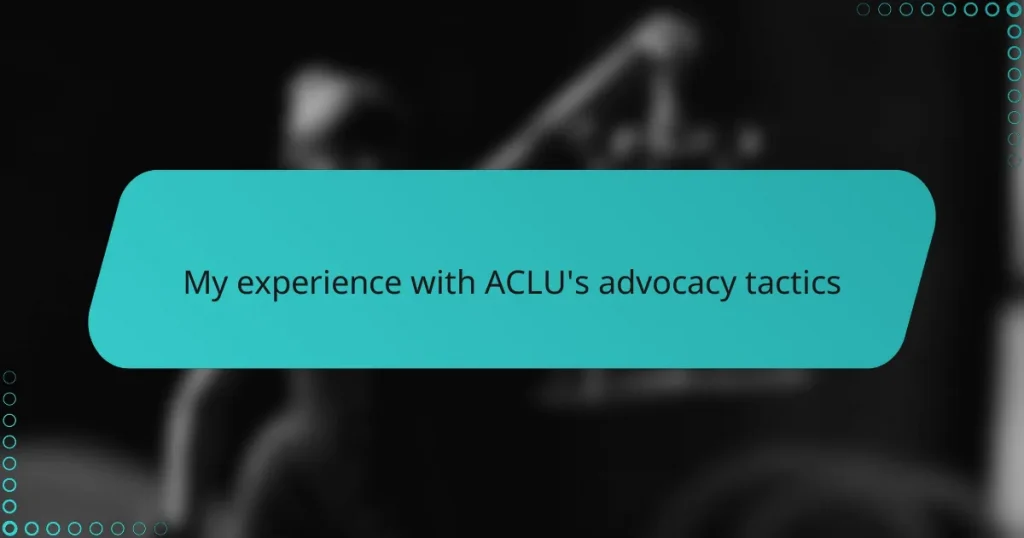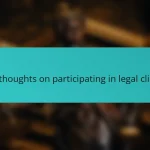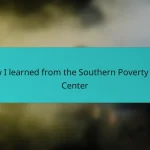Key takeaways
- Legal advocacy is rooted in principles of fairness, transparency, and respect for individual rights, demanding both intellectual understanding and emotional connection.
- The ACLU employs strategic litigation, coalition-building, and storytelling to effectively advocate for civil liberties and mobilize public support.
- Impact goes beyond winning cases; the ACLU shapes legal standards and public understanding simultaneously, fostering a broader conversation on civil rights.
- Collaboration and persistence are key lessons from the ACLU, emphasizing that meaningful advocacy connects legal issues with human experiences and community involvement.
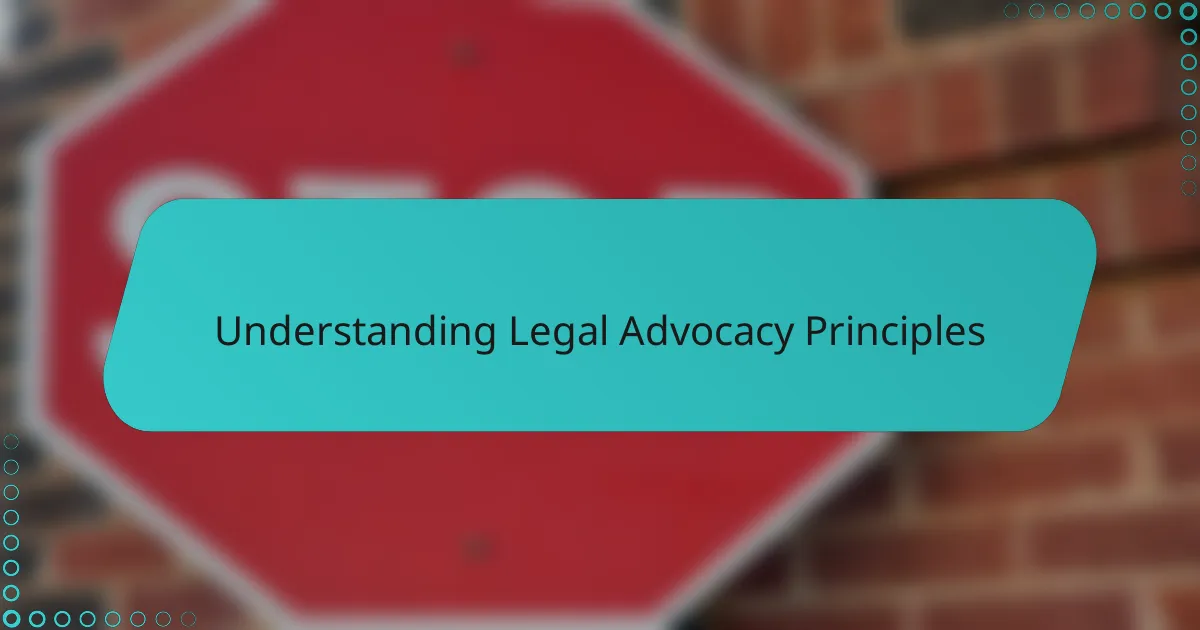
Understanding Legal Advocacy Principles
Legal advocacy, from what I’ve learned through experience, is much more than just arguing in court. It’s about understanding the core principles that drive justice—fairness, transparency, and respect for individual rights. Have you ever paused to consider how these values shape every move an advocate makes?
When I first encountered these principles, I was struck by their simplicity and power. They act as a compass, guiding advocates through complex legal terrain while maintaining a commitment to ethical standards. This grounding often feels like the difference between advocacy that truly changes lives versus mere legal maneuvering.
I’ve also found that understanding these principles calls for more than intellectual grasp; it demands emotional connection. Legal advocacy must empathize with those it serves, meeting real human struggles head-on. Without that, advocacy risks becoming detached and ineffective—something I’ve witnessed firsthand in less principled efforts.
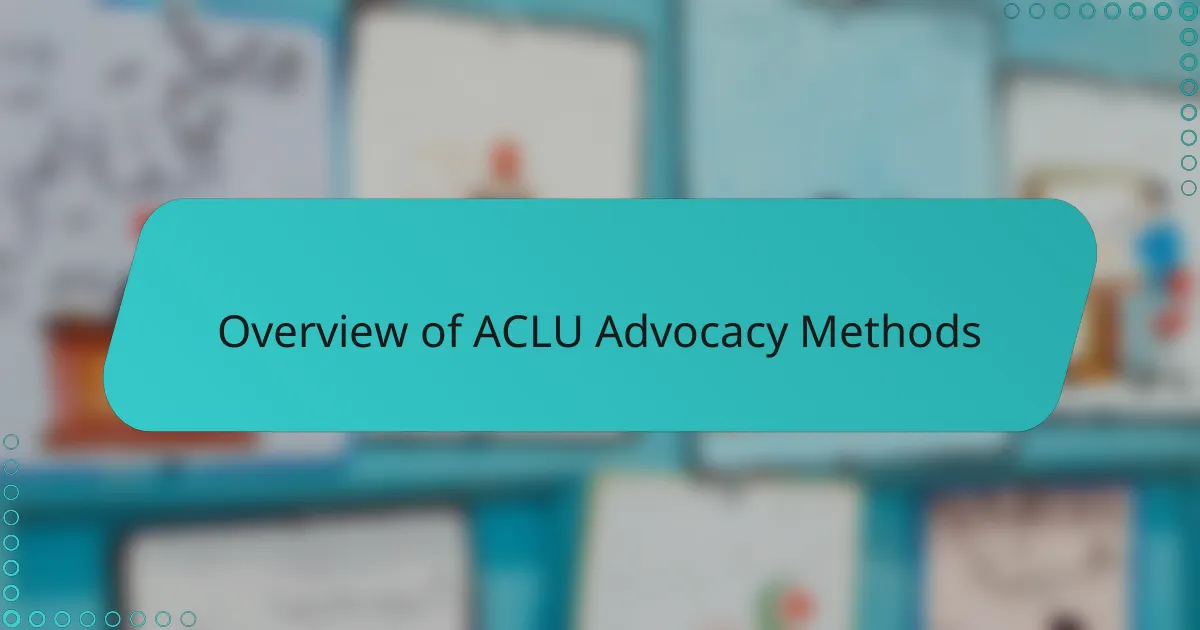
Overview of ACLU Advocacy Methods
The ACLU’s advocacy methods surprised me by how thoughtfully they blend legal expertise with grassroots activism. It’s not just about filing lawsuits; they engage communities, harness public opinion, and push for policy changes simultaneously. Have you ever seen an organization fight on so many fronts at once?
What struck me most was their strategic use of storytelling to humanize complex legal issues. By sharing personal narratives of those affected, they transform abstract rights into urgent, relatable matters. I remember feeling moved—and motivated—when hearing these stories during their campaigns.
Another tactic that stood out was their relentless persistence, even in the face of setbacks. They don’t back down after one loss; instead, they adapt and come back stronger, which to me exemplifies true dedication to justice. It made me question—how often do we give up too soon in our own advocacy efforts?
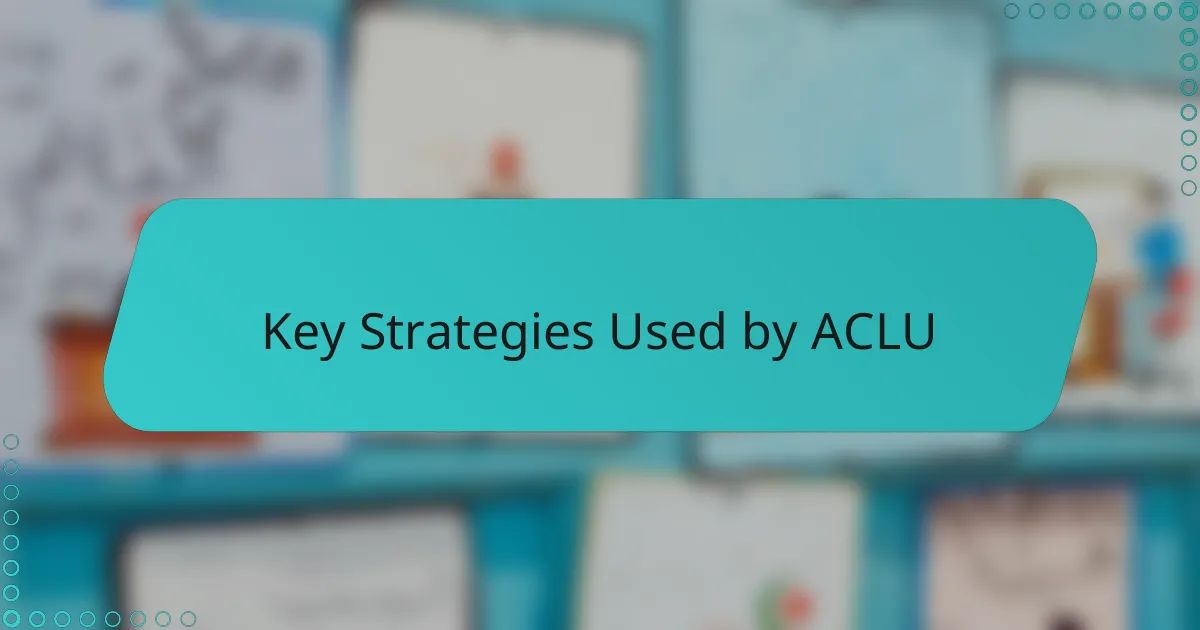
Key Strategies Used by ACLU
One strategy that really caught my attention is the ACLU’s focused use of strategic litigation. They pick cases that not only have legal merit but also the potential to set important precedents. I remember feeling impressed by how carefully they weigh each case’s broader impact, asking themselves, “Will this decision change the legal landscape for everyone, not just this one person?”
Their approach to coalition-building also stands out. Rather than working in isolation, they partner with diverse groups—activists, community leaders, even other nonprofits—to amplify their reach. I’ve seen firsthand how combining different voices creates a powerful chorus that can’t be easily ignored, making advocacy feel less like a solo effort and more like a movement.
What I find most inspiring, though, is their emphasis on education and public engagement. The ACLU doesn’t just fight in courtrooms; they actively inform and mobilize the public through workshops, campaigns, and social media. It makes me think: isn’t advocacy strongest when people understand their rights and feel empowered to defend them? From my experience, this keeps legal battles connected to the community’s heartbeat.
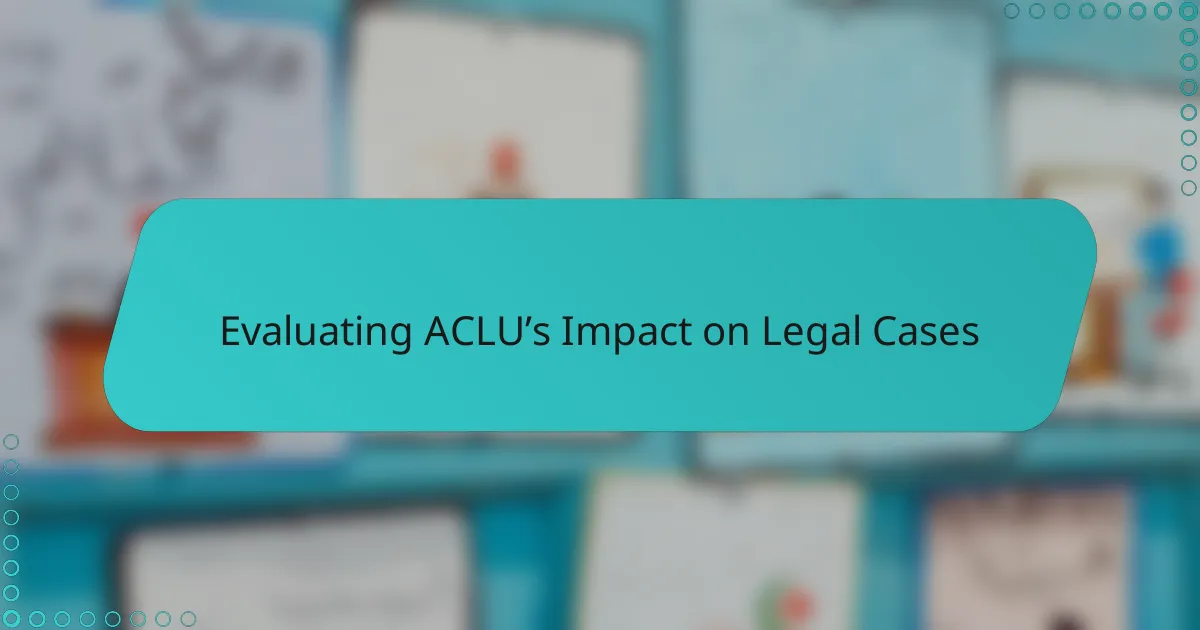
Evaluating ACLU’s Impact on Legal Cases
Evaluating the ACLU’s impact on legal cases, I’ve been struck by how their victories often extend beyond the courtroom. It’s not just about winning a particular case; it’s about setting new legal standards that ripple through the justice system. Have you ever noticed how a single precedent can protect countless others who might never even step into a court?
From my perspective, what makes their impact profound is their ability to shape public understanding alongside legal outcomes. I recall one case where their work didn’t just secure a win but sparked a nationwide conversation on civil liberties. That kind of dual effect feels rare in legal advocacy and shows how law and public awareness go hand in hand.
Yet, I’ve also seen the limits of impact, especially when entrenched opposition slows progress despite strong legal arguments. It made me wonder—how do advocates sustain hope and momentum when change feels incremental? In my experience, the ACLU’s persistence is a reminder that meaningful impact often arrives through steady, unwavering effort rather than quick wins.
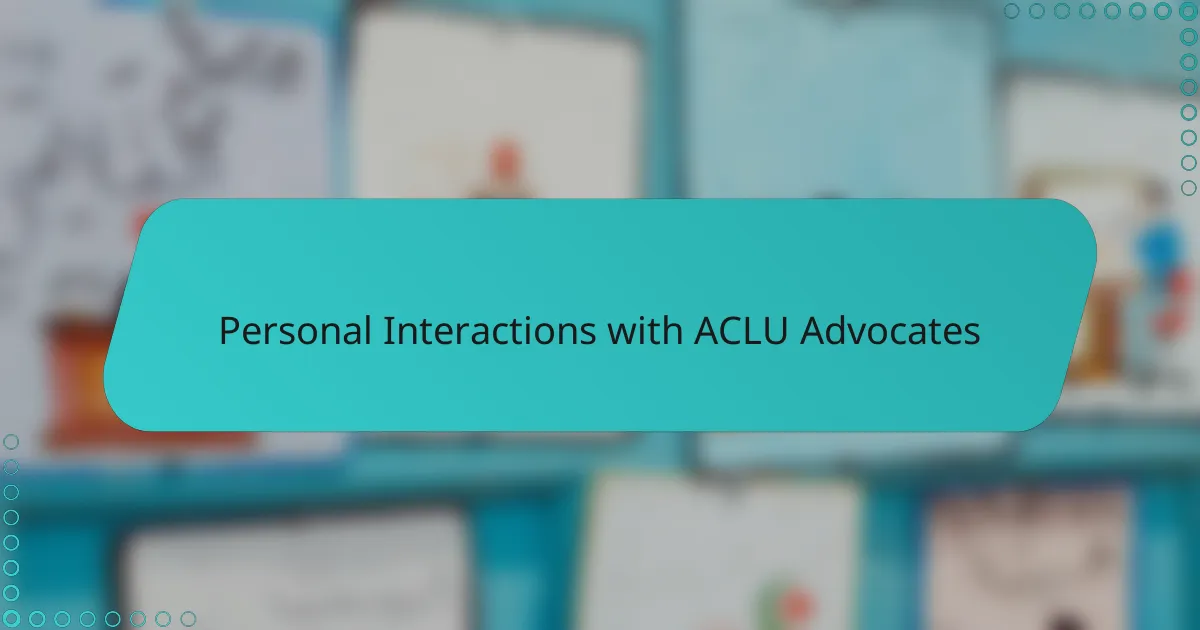
Personal Interactions with ACLU Advocates
When I first met ACLU advocates, I was immediately struck by their passion—not just for the law but for the people behind each case. Their genuine care made me realize that advocacy is as much about listening and human connection as it is about legal arguments. Have you ever encountered someone so deeply committed that it almost changes how you view the issues at hand?
One moment that stands out to me was during a community meeting where an ACLU advocate patiently addressed concerns that seemed unrelated to law but rooted in everyday fears. Seeing their ability to bridge legal knowledge with empathy reminded me how advocacy can be both accessible and empowering. It made me think: isn’t the best advocacy the kind that meets people where they are?
I also appreciated how open they were to questions, never assuming expertise or talking over others. This willingness to engage, explain, and sometimes even learn from the community felt like a rare quality in legal advocacy. It left me wondering—how often do legal advocates create these spaces that invite real dialogue rather than just deliver statements?
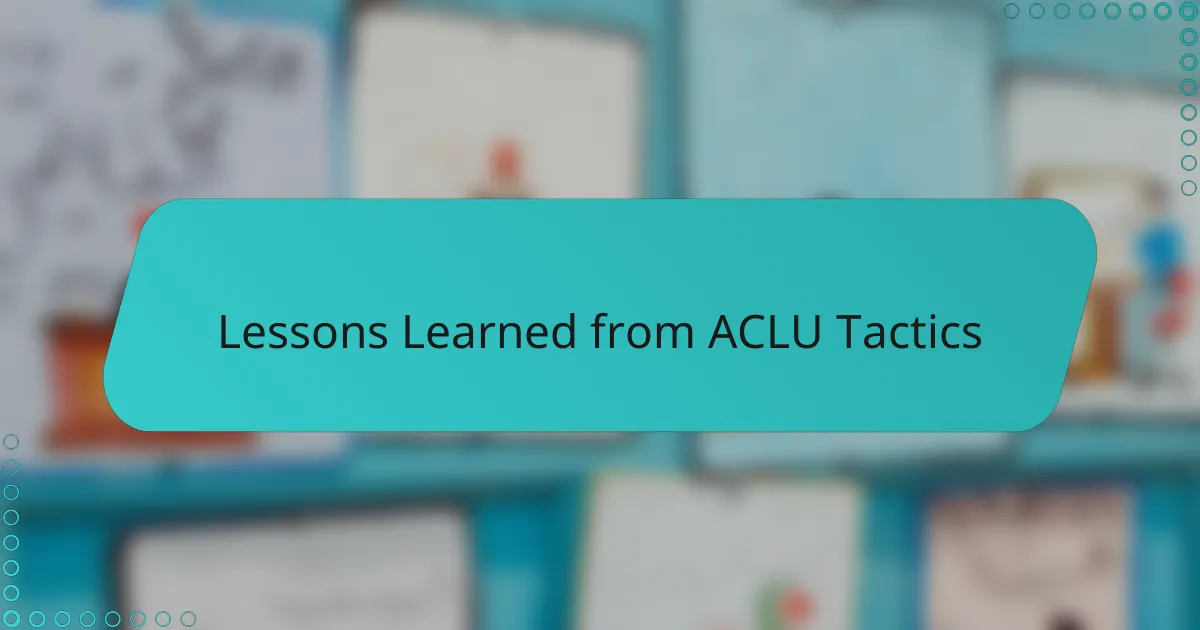
Lessons Learned from ACLU Tactics
One lesson I’ve taken from the ACLU’s tactics is the power of persistence. Watching them navigate repeated setbacks without losing momentum reminded me that real change rarely comes overnight. Have you ever been discouraged by slow progress, only to realize later that every small step was building toward something bigger?
Their commitment to coalition-building taught me that advocacy is never a solo venture. I recall a time when partnering with diverse groups amplified our message beyond what I initially thought possible. Doesn’t it make you wonder how much stronger we become when we unite voices around a common cause?
Finally, I learned the value of storytelling to connect legal battles to human experiences. One campaign where personal narratives were front and center made the issues come alive for me in a way dry legal arguments never did. Isn’t it true that people engage and act more when they see the real faces behind the fight?
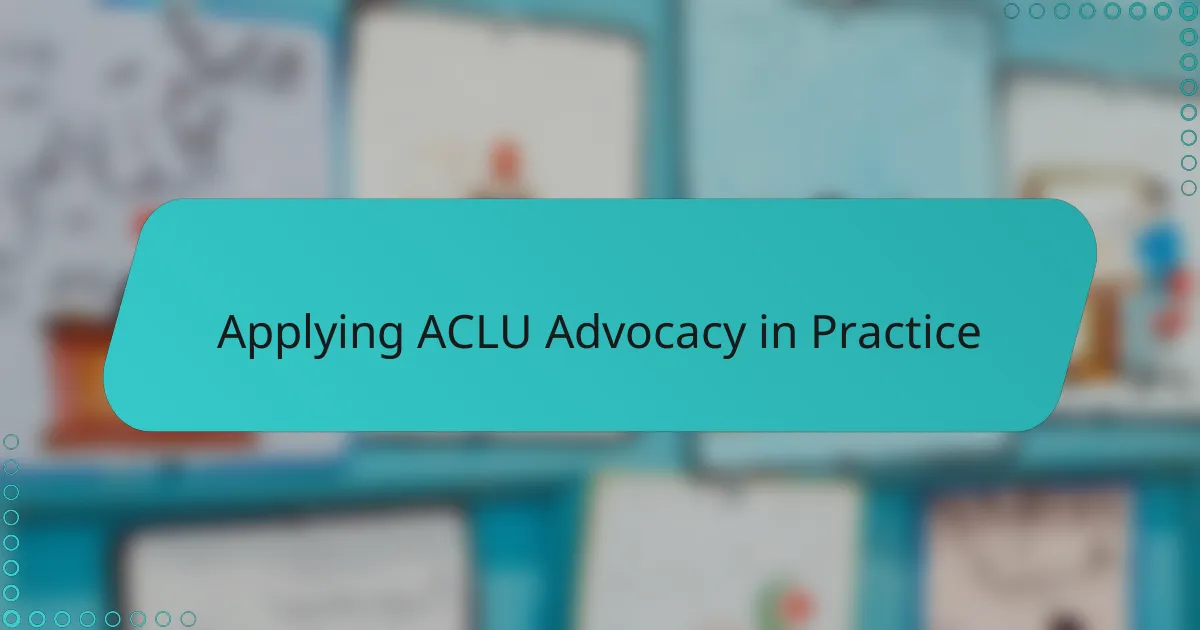
Applying ACLU Advocacy in Practice
Applying the ACLU’s advocacy tactics in real-world settings revealed to me how vital flexibility is. Legal battles rarely follow a straight path, and I’ve seen how adapting strategies—whether shifting from courtroom focus to public engagement or recalibrating messaging—can keep momentum alive even when obstacles arise. Have you ever noticed how being rigid can stall progress, while openness invites unexpected avenues forward?
Another aspect I found crucial is the emphasis on collaboration. Drawing from my experience, working alongside community groups and other advocates often brings fresh perspectives that enrich legal arguments and broaden impact. It’s not just about legal expertise but about building a network that amplifies the cause—a lesson the ACLU embodies well.
Finally, putting ACLU style advocacy into practice made me appreciate storytelling as a bridge between law and people’s lived experiences. I recall one instance where sharing a client’s personal journey transformed a dry legal debate into a compelling call to action, mobilizing support far beyond what I anticipated. Isn’t advocacy most powerful when it moves hearts as much as it moves courts?
